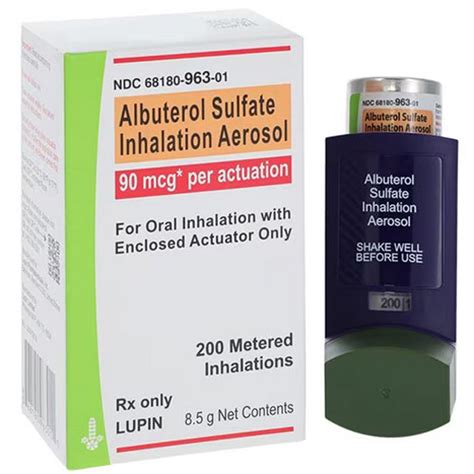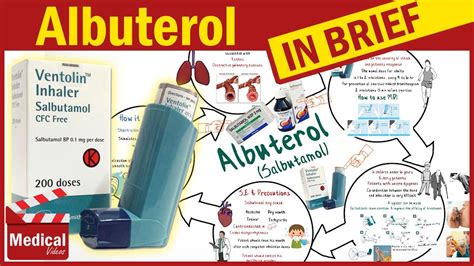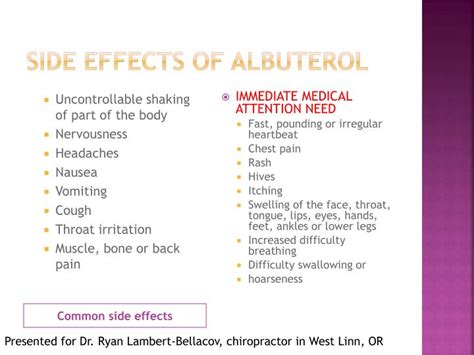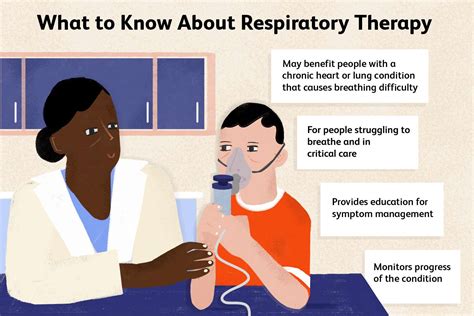Intro
Discover Albuterol Sulfate HFA Inhalation Aerosol, a bronchodilator for asthma and COPD relief, providing quick symptom management and respiratory care through inhalation therapy.
Albuterol sulfate HFA inhalation aerosol is a medication used to treat and prevent bronchospasm, a condition characterized by the tightening of airway muscles, which can lead to difficulty breathing. This medication is commonly prescribed for individuals with asthma, chronic obstructive pulmonary disease (COPD), and other respiratory disorders. The importance of understanding albuterol sulfate HFA inhalation aerosol lies in its ability to provide quick relief from bronchospasm symptoms, improving the quality of life for those affected by these conditions.
The prevalence of respiratory diseases such as asthma and COPD has increased significantly over the years, making medications like albuterol sulfate HFA inhalation aerosol crucial in managing symptoms. Moreover, the development of HFA (hydrofluoroalkane) inhalers has replaced traditional CFC (chlorofluorocarbon) inhalers, which were harmful to the ozone layer. This shift towards environmentally friendly inhalers highlights the ongoing efforts to improve patient care while minimizing environmental impact.
For individuals living with respiratory conditions, understanding the benefits, working mechanisms, and proper use of albuterol sulfate HFA inhalation aerosol is essential. This knowledge empowers patients to manage their symptoms effectively, reduce the risk of complications, and lead more active lives. Furthermore, healthcare providers must stay updated on the latest guidelines and recommendations for prescribing and monitoring the use of this medication to ensure optimal patient outcomes.
Introduction to Albuterol Sulfate HFA Inhalation Aerosol

Albuterol sulfate HFA inhalation aerosol belongs to a class of medications known as bronchodilators, which work by relaxing the muscles in the airways and increasing air flow to the lungs. This makes it easier to breathe and helps to relieve symptoms such as wheezing, coughing, chest tightness, and shortness of breath. The medication is administered via an inhaler, which delivers a precise dose of albuterol sulfate directly to the lungs, providing quick and targeted relief.
How Albuterol Sulfate HFA Inhalation Aerosol Works
The mechanism of action of albuterol sulfate involves the stimulation of beta-2 adrenergic receptors in the lungs, leading to the relaxation of bronchial smooth muscles. This action results in the dilation of the airways, reducing resistance to airflow and facilitating easier breathing. The effects of albuterol sulfate are usually felt within a few minutes of inhalation and can last for several hours, depending on the individual and the severity of their condition.Benefits of Using Albuterol Sulfate HFA Inhalation Aerosol

The benefits of using albuterol sulfate HFA inhalation aerosol include:
- Quick relief from bronchospasm symptoms
- Improved lung function
- Enhanced exercise tolerance
- Reduced frequency of asthma attacks
- Environmentally friendly due to the use of HFA propellant
Proper Use and Administration
To achieve the best results from albuterol sulfate HFA inhalation aerosol, it is crucial to use the medication as directed by a healthcare provider. This includes: - Using the inhaler correctly to ensure the delivery of the correct dose - Avoiding overuse, as this can lead to decreased effectiveness and increased side effects - Monitoring asthma symptoms and adjusting the treatment plan as necessary - Keeping track of the number of inhalations used to avoid running out of medicationSide Effects and Precautions

While albuterol sulfate HFA inhalation aerosol is generally well-tolerated, it can cause side effects, including:
- Tremors
- Nervousness
- Headache
- Dizziness
- Insomnia
- Rapid heartbeat
- Muscle cramps
It is essential to discuss any concerns or pre-existing conditions with a healthcare provider before starting treatment with albuterol sulfate HFA inhalation aerosol. This includes pregnancy, breastfeeding, and other medical conditions such as diabetes, heart disease, and high blood pressure.
Interactions with Other Medications
Albuterol sulfate HFA inhalation aerosol can interact with other medications, including: - Beta blockers - Diuretics - Digoxin - Monoamine oxidase inhibitors (MAOIs) - Tricyclic antidepressantsThese interactions can increase the risk of side effects or reduce the effectiveness of the medication. Therefore, it is crucial to inform healthcare providers about all medications being taken, including prescription drugs, over-the-counter medications, and herbal supplements.
Steps for Effective Management

Effective management of respiratory conditions with albuterol sulfate HFA inhalation aerosol involves:
- Monitoring Symptoms: Keeping a diary to track symptoms, inhaler use, and any side effects.
- Adhering to Treatment Plans: Using the medication as directed and attending follow-up appointments with healthcare providers.
- Avoiding Triggers: Identifying and avoiding triggers that can exacerbate symptoms, such as allergens, smoke, and pollution.
- Maintaining a Healthy Lifestyle: Engaging in regular exercise, eating a balanced diet, and getting enough sleep to help manage symptoms and improve overall health.
Conclusion and Future Perspectives
In conclusion, albuterol sulfate HFA inhalation aerosol is a vital medication for the management of bronchospasm associated with asthma, COPD, and other respiratory conditions. Its effectiveness in providing quick relief from symptoms and improving lung function makes it a cornerstone in respiratory care. As research continues to advance, we can expect to see improvements in inhaler technology, medication formulations, and treatment strategies, further enhancing patient outcomes and quality of life.
Final Thoughts and Recommendations

For individuals living with respiratory conditions, it is essential to work closely with healthcare providers to develop a personalized treatment plan that includes albuterol sulfate HFA inhalation aerosol. By understanding the benefits, proper use, and potential side effects of this medication, patients can better manage their symptoms and improve their quality of life. Moreover, ongoing research and advancements in respiratory care offer promising futures for more effective treatments and improved patient outcomes.

Engagement and Community Support

We invite readers to share their experiences, ask questions, and engage in discussions about albuterol sulfate HFA inhalation aerosol and respiratory health. By fostering a community of support and knowledge sharing, we aim to empower individuals to take control of their health and well-being. Please feel free to comment below, share this article with others who may benefit, and explore additional resources for managing respiratory conditions.
What is albuterol sulfate HFA inhalation aerosol used for?
+Albuterol sulfate HFA inhalation aerosol is used to treat and prevent bronchospasm associated with asthma, COPD, and other respiratory disorders.
How does albuterol sulfate HFA inhalation aerosol work?
+Albuterol sulfate works by stimulating beta-2 adrenergic receptors in the lungs, leading to the relaxation of bronchial smooth muscles and the dilation of airways.
What are the common side effects of albuterol sulfate HFA inhalation aerosol?
+Common side effects include tremors, nervousness, headache, dizziness, insomnia, rapid heartbeat, and muscle cramps.
